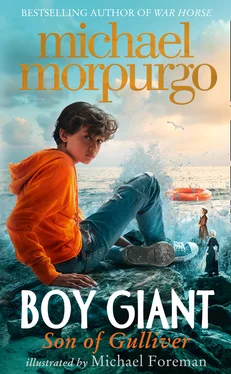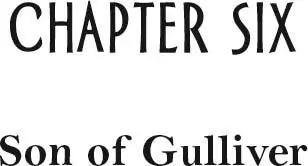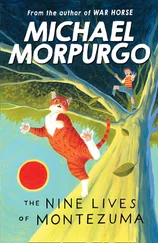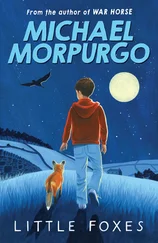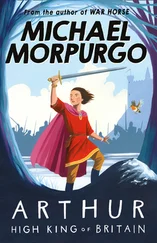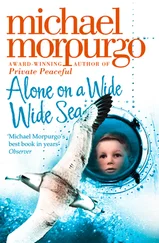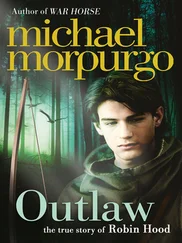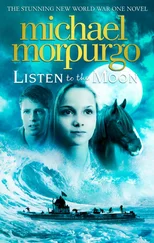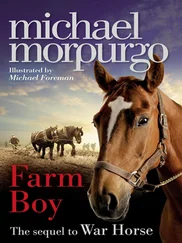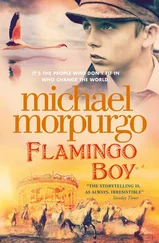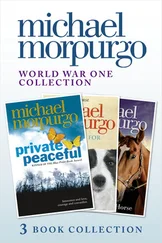Meanwhile, the little people, led by the children, were crowding all around me, reaching out to touch my feet, my hands, my clothes. I was being examined, investigated. Then, more confident now, they were beginning to clamber up on to me. I did not feel in the least threatened by them. I could tell they meant me no harm. It didn’t seem to be in their nature. The girls and boys amongst them were much more daring than the grown-ups, and were already all over me, shinning easily up every nook and cranny of me. I was thinking that I must have been like a mountain to them.
‘Me? A mountain?’ I laughed aloud at the thought of it. Little Omar was a mountain! Tiny was a mountain! If my friends could see me now. If Mother could see me now! Oh how I wished Mother could see me now.
Then they were pulling all the blankets off me, and rubbing me vigorously all over. I lay back and closed my eyes as the blessed warmth flooded me from the tips of my toes to the roots of my hair. These little people were bringing me back to life.
I started to hum. Maybe it was because I was reminded of the comfort and warmth I remembered as a small boy at bedtime when Mother had held me close and sung to me. It was her song that came back to me then, her lullaby, that I found myself humming.
After a while they began to hum along with me, and I loved that. I knew then for sure that I was amongst friends, and safe at last. Exhaustion and relief, the rhythm of the waves lapping on the beach and the sound of Mother’s tune in my head must have been enough to send me off to sleep again.
But I did not sleep for long. I felt my eyelids being prised open. The children had decided to wake me. I woke to find hundreds of these little people crawling all over me. Some were doing handstands and backf lips, some had taken to tumbling off me for fun, and then climbing back up again.
Down the beach I saw that the old woman was still sitting on her rock, her companion beside her. A few others were gathering around her, and kept glancing back up at me as she was talking to them.
After some time the old lady at last got to her feet and began to walk up the beach towards me, her companion holding her elbow to steady her as she came. The children were called away. They jumped down off me, some of them reluctantly, and were soon standing in amongst the grown-ups, quietened down and waiting. I felt something important was about to happen.
I raised myself up on to my elbows. A silence had fallen over the beach. They were all looking expectantly at the old lady now, as I was too. For long moments she said nothing. Then, as she came closer, I saw that there were tears in her eyes, and I could see now that they were tears of recognition.
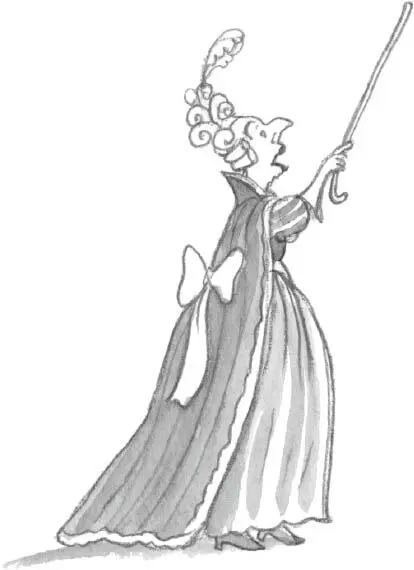
‘Gulliver,’ she said softly, pointing her stick up at me. Then louder, and louder, ‘Gulliver?’ she cried. ‘Gulliver?’
What ‘Gulliver’ meant I had no idea. Not then, anyway.
But from the way the old lady was talking and the way she was looking at me, the way they were all looking at me, I had the distinct feeling that I really was being welcomed home , as if I was some long-lost relative. The more I thought about it, the more I was sure that was who they believed I was. I must be ‘Gulliver’ – I was someone they all already knew and loved.
‘Gulliver! Gulliver!’
They were all shouting it out now, chanting it. I was some kind of a hero to these little people, to the children especially. Who they thought I was I could not imagine, nor did that bother me at all. I was quite happy to bask in such a joyous welcome. I responded by lifting my hands in the air and waving to them, which caused them to cheer and shout even louder. And then in amongst the chants of ‘Gulliver! Gulliver!’ I began to hear ‘Welcome, Gulliver. Owzat! Owzat!’
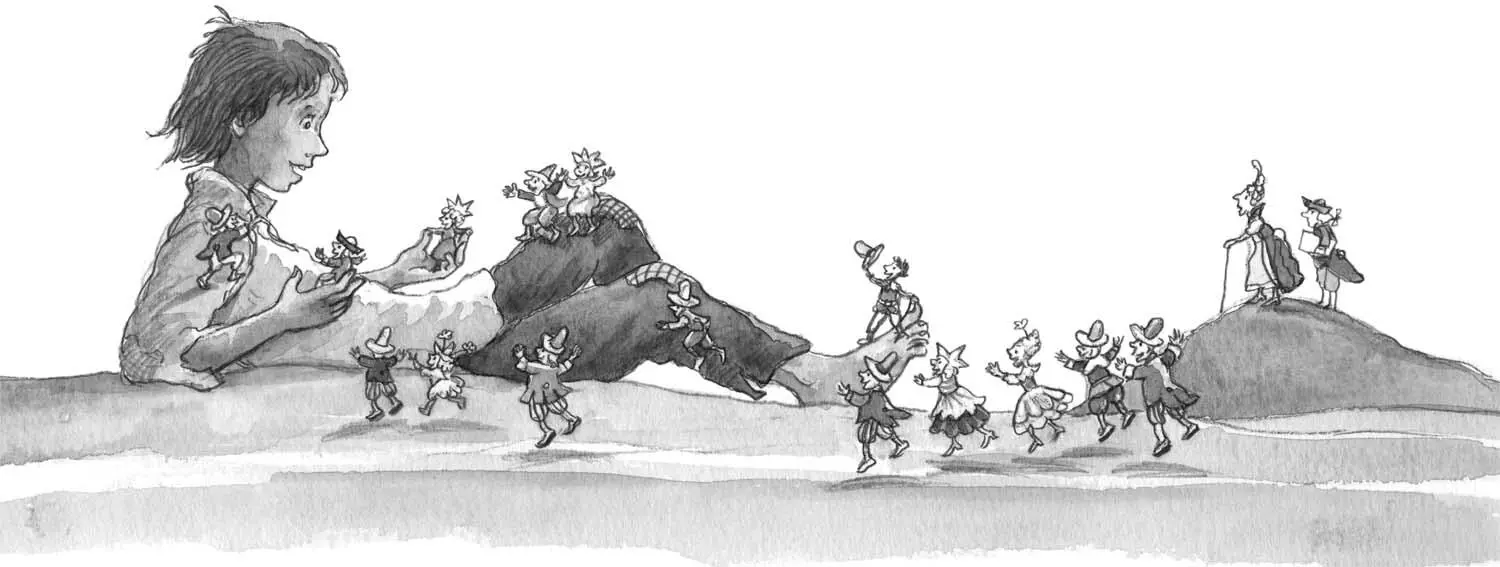
The more they chanted, the more I was sure they were using English words, spoken differently maybe, but definitely English words. It was the language of cricket, the language of aid workers in the camp. So, getting to my feet – and I was still unsteady at first – I raised my arms again and chanted back at them, ‘Gulliver! Gulliver! Owzat! Owzat!’
And then I thought of another word the aid workers in the refugee camp had taught me. ‘Hello!’ I shouted back. ‘Hello!’
I could tell from the delight on their faces that this was a word they knew, that they recognised, an English word. So this had to be England! And if I was in England, then Uncle Said and his café might not be far away. Mevagissey was not far away.
These people may be little, I thought, and all the doctors and aid workers I had known had been giants compared to them. But you could have ordinary-sized people and tiny people living in England, in the same country, couldn’t you? Why not? I told myself. I had arrived! I was safe and I was in England, where Mother had promised we would be. I had only to wait for her here, as she had said. Mother had been right about something else too. These English people were smiling people, welcoming people.
I was filled with relief, bursting with happiness. I punched the air again and again and cried out, ‘Owzat! Owzat!’
The tiny people were joining in, echoing every word. ‘Fore Street! Mevagissey! Four! Six! Not out! High five!’
Whenever I shouted out, punching the air, the name they had given me – ‘Gulliver! Gulliver!’ – they went wild. And they went wilder still when I began chanting ‘Owzat! Owzat!’
But then I noticed that the old lady was not joining in all this excitement. She was sitting there on her rock, looking up at me, her brow furrowed. She got to her feet then, and began to walk towards me, on the arm of her companion. I crouched down to be closer to her, holding out my hand in friendship. I was worried I had angered her somehow, and wanted to make it up to her.
She said nothing for a while, but was looking at me long and hard. Then she reached out and took my finger, gently drawing my hand towards her, so that she and her companion could step up on to it. Once they were balanced, I lifted them up very carefully, keeping my hand steady, so that they would not fall over. We were face to face now. The crowd had fallen quite silent.
The old lady and her companion were standing side by side in the palm of my hand. There was no fear in their eyes, only intense curiosity. Beckoning me closer she reached out her hand to touch my face. Then she was brushing the hair away from my forehead. A sudden smile came over her.
‘Not Gulliver,’ she said softly. ‘Son of Gulliver.’ Then she turned and proclaimed it out loud to the crowd. ‘Son of Gulliver! He is Son of Gulliver!’
There was a gasp of amazement at this, from all around. So now I was a son of this Gulliver. And I knew what ‘son’ meant. One of the aid workers in the refugee camp – Jimbo he was called – had shown me photographs on his phone of a boy about my age, obviously his son, holding a cricket bat – he liked cricket too, and Jimbo was the one who used to call me ‘son’. ‘Hello, son,’ he’d say to me sometimes. ‘You all right, son?’
So now I was ‘Son of Gulliver’. I could think of nothing else to do but look as pleased as the old lady was, as her companion was, as everyone seemed to be. I called out, ‘Son of Gulliver! Son of Gulliver! Owzat!’
Читать дальше
